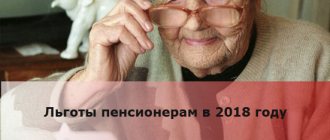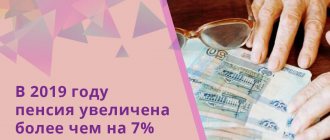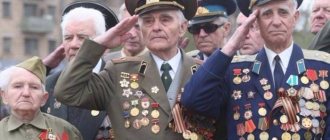As always, I advise and advise you, Elena Troskina. I am revealing my experience and knowledge in the legal field, my experience is more than 10 years, this makes it possible to give the correct answers to what may be necessary in various situations and now we will consider - Benefits for pensioners in the Moscow region in 2021 in the metro. If there are no professionals in your city, you can write your question, and I will answer everyone as I process it. Or it would be even better to ask in the comments regular readers/visitors who have previously encountered the same issue and may know other ways to solve it.
Attention please, the data may not be relevant at the time of reading, laws are updated and supplemented very quickly, so we look forward to your subscription to us on social media. networks so that you are aware of all updates.
- pre-retirees;
- pensioners whose pension is assigned in accordance with the legislation of the Russian Federation;
- citizens awarded the badge “Honorary Donor of Russia”, “Honorary Donor of the USSR” and “Honorary Donor of Moscow”;
- parents and other legal representatives of disabled children;
- parent of a disabled person since childhood, studying in organizations that carry out educational activities in educational programs of secondary vocational education, educational programs of higher education - bachelor's degree, specialty programs or master's programs - up to 23 years;
- children from large families under the age of 16 (students in schools - up to 18);
- one of the parents in a large family;
- orphans and children left without parental care; persons from among orphans and children left without parental care; persons who lost both parents or a single parent during their studies, studying full-time at the expense of the Moscow budget in basic vocational educational programs and (or) vocational training programs for blue-collar professions and office positions;
- one of the guardians, trustees, foster parents, foster carers (sole guardian, trustee, foster parent, foster carer) raising an orphan or a child without parental care under the age of 18;
- recipients of city social support measures who did not choose to provide the service in monetary terms. It can be:
- recipients of the EGDV (monthly city cash payment):
- home front workers;
- labor veterans and persons equivalent to them;
- rehabilitated persons;
- citizens recognized as victims of political repression.
Who is entitled to free travel on the train?
- home front workers;
- labor veterans and persons equivalent to them, as of December 31, 2021;
- rehabilitated persons who were subjected to unjustified political repression;
- citizens recognized as victims of political repression;
- participants in the defense of Moscow;
- participants in the prevention of the 1962 Cuban Missile Crisis;
- pensioners (not belonging to other benefit categories);
- parents and other legal representatives of disabled children;
- parent of a disabled person since childhood, studying in organizations that carry out educational activities in educational programs of secondary vocational education, educational programs of higher education - bachelor's degree, specialty programs or master's programs - up to 23 years of age;
- persons accompanying disabled people of group I and disabled children;
- citizens awarded with badges “Honorary Donor of the USSR” and “Honorary Donor of Russia”;
- children from families with 3 or more children until each child reaches the age of 16 years (if the child is in school - until he reaches the age of 18);
- one of the parents of a family with 3 or more children until the youngest child reaches the age of 16 years (if the youngest child is in school - until he reaches the age of 18);
- orphans, children left without parental care, as well as persons from among orphans and children left without parental care;
- guardian (trustee), foster parent raising a child without parental care or an orphan under the age of 18;
- foster care provider for a child in need of government support;
- pre-retirees.
We recommend reading: Maximum duration of sick leave for a stroke
Who is entitled to free travel on the MCC and MCD?
Yes they can. Almost all federal and regional beneficiaries registered at their place of residence in the Moscow region can ride free of charge on Moscow public transport. The full list of beneficiaries can be found in the agreement concluded between Moscow and the Moscow Region, and on the website of the Government of the Moscow Region.
Preferential categories of residents of the Moscow region, who already use commuter rail transport free of charge, will not pay for travel on the Moscow metro, including the MCC and MCD. And such citizens, deputies counted, are 486 thousand
.
Who is eligible for free travel?
Pensioners are a category of people who especially need support and assistance from the state. According to a social survey, the pension is only enough to buy food and pay for utilities.
Is there a discount on metro travel for pensioners?
Benefits for pensioners allow them to take free trips on the metro or provide a good discount on the fare. The price of one Moscow metro ticket is quite high; it is very difficult for pensioners to pay such an amount.
- Disabled people and participants of the Great Patriotic War and disabled combatants;
- persons who worked during the Great Patriotic War at air defense facilities and other military facilities within the rear boundaries of active fronts;
- former minor prisoners of concentration camps;
- persons awarded the badge “Resident of besieged Leningrad”;
- family members of deceased war invalids, participants in the Great Patriotic War and combat veterans, family members of deceased military personnel;
- disabled people with disability groups I, II, III;
- persons accompanying disabled people with disability group I;
- disabled children under 18 years of age;
- citizens affected by radiation who had the right to free travel on public public transport before January 1, 2005;
- labor veterans and military service veterans;
- home front workers;
- rehabilitated persons and persons who suffered from political repression;
- persons awarded the medal “For the Defense of Moscow” who are not WWII veterans;
- persons awarded the sign “Honorary Donor of the USSR” or “Honorary Donor of Russia”;
- children from large families;
- one of the parents is from a large family;
- pensioners;
- persons who have reached the pre-retirement age of 60 and 55 years;
- persons under 60 years of age and receiving a pension;
- one guardian (trustee), foster parent, foster carer raising an orphan or a child without parental care;
- one of the parents of a disabled person from childhood studying full-time until he completes his studies, but no longer than until he reaches the age of 23;
- children under 7 years old.
- Disabled people and participants of the Great Patriotic War and disabled combatants;
- persons who worked during the Great Patriotic War at air defense facilities and other military facilities within the rear boundaries of active fronts;
- former minor prisoners of concentration camps;
- persons awarded the badge “Resident of besieged Leningrad”;
- family members of deceased war invalids, participants in the Great Patriotic War and combat veterans, family members of deceased military personnel;
- disabled people with disability groups I, II, III;
- persons accompanying disabled people with disability group I;
- disabled children under 18 years of age;
- citizens affected by radiation who had the right to free travel on public public transport before January 1, 2005;
- labor veterans and military service veterans;
- home front workers;
- rehabilitated persons and persons who suffered from political repression;
- persons awarded the medal “For the Defense of Moscow” who are not WWII veterans;
- persons awarded the sign “Honorary Donor of the USSR” or “Honorary Donor of Russia”;
- parents and other legal representatives of disabled children under 18 years of age;
- children receiving a survivor's pension;
- children from large families;
- one of the parents of a large family, which includes a child under 7 years of age;
- legal representative of a child under 7 years of age from a large family;
- persons aged 60 years and older;
- persons receiving a pension;
- persons who have reached the pre-retirement age of 60 and 55 years;
- persons under 60 years of age and receiving a pension;
- children under 7 years old;
- Disabled people and participants of the Great Patriotic War and disabled combatants;
- persons who worked during the Great Patriotic War at air defense facilities and other military facilities within the rear boundaries of active fronts;
- former minor prisoners of concentration camps;
- persons awarded the badge “Resident of besieged Leningrad”;
- family members of deceased war invalids, participants in the Great Patriotic War and combat veterans, family members of the deceased;
- disabled people with disability groups I, II, III;
- persons accompanying disabled people with disability group I;
- disabled children under 18 years of age;
- citizens affected by radiation who had the right to free travel on public public transport before January 1, 2005;
- labor veterans and military veterans (age benefits);
- home front workers;
- rehabilitated persons and persons who suffered from political repression;
- persons awarded the medal “For the Defense of Moscow” who are not WWII veterans;
- persons awarded the sign “Honorary Donor of the USSR” or “Honorary Donor of Russia”;
- parents and other legal representatives of disabled children under 18 years of age;
- children receiving a survivor's pension;
- children from large families;
- persons accompanying disabled children under 18 years of age;
- one of the parents of a large family, which includes a child under 7 years of age;
- legal representative of a child under 7 years of age from a large family;
- persons aged 60 years and older;
- pensioners;
- children under 7 years old.
You may like => Write to which police officer got 32% added to their pension for VBD
The draft law was developed to extend the deadlines for providing additional social support measures for free travel for certain categories of citizens residing in the Moscow region, said the Minister of Social Development of the region, Irina Faevskaya, at a meeting of the Moscow Regional Duma on Thursday, presenting the bill.
She noted that changes are being made to the law of the Moscow region, which provides for free travel on suburban railway transport, and to the law of the Moscow region, which provides for travel in Moscow on all types of passenger transport and in the Moscow metro.
Over a million people enjoy the right to free travel on suburban railway transport in the Moscow region, about 500 thousand on ground transport in Moscow, and over 300 thousand residents of the Moscow region enjoy the right to free travel in the metro.
To obtain the right to a preference, it is necessary to collect a certain package of documentation, draw up an application and submit all papers to the authorized bodies. After checking the documents, Moscow pensioners are issued a social card.
Example 1. “Transport” benefits for a labor veteran living in Moscow
Only social card. You need to go to the suburban ticket office at the railway station, where the card will be encoded in a special way. After this, you can issue a free ticket using a social card at any suburban station ticket office or using ticket printing machines.
Free travel for pensioners in the Moscow region
Pensioners could count on free travel by using a social card or by obtaining a travel pass with subsequent compensation. Compensation of funds was guaranteed at the legislative level by the relevant decree of the Russian government.
- receive for it all types of payments provided for by federal and regional legislation - pensions, benefits, daily allowance, etc.;
- do not pay for annual maintenance;
- receive cashback in the amount of 4% per annum on your account balance;
- use contactless payment technology in stores;
- withdraw cash from ATMs and branches of the Bank of Moscow without commission.
- passport (or other document identifying the pensioner);
- pension certificate (or other documents confirming eligibility for a social card - for example, a certificate from the ITU on recognition as a disabled person);
- compulsory medical insurance policy;
- OPS insurance certificate (SNILS);
- a photograph measuring 3 by 4 (you can bring it with you or take it directly at the public services center).
How to use your right to free travel on trains
However, directly in the Moscow region, an ordinary pensioner near Moscow - “not a benefit recipient” - can get a Moscow Region resident card and enjoy the same benefits as in Moscow (but only on the territory of the Moscow Region) - that is, ride for free on city vehicles and commuter trains.
In St. Petersburg, you can issue or buy a discounted pass at the metro ticket office. You need to have a document with you confirming the benefit, for example a pension certificate. You can confirm your right to free or discounted travel at school or in person at the carrier’s office - St. Petersburg State Public Institution “Transportation Organizer”.
Bus travel for privileged categories is free if the state provides them with benefits for travel on public transport. If you qualify for a discount on a commuter bus, make sure you can take advantage of the discount pass or discount before you board. Ask the conductor or driver about this.
Who is entitled to benefits on public transport?
Amount of benefits. In Moscow, they ride public transport for free or receive compensation of 378 rubles per month. In St. Petersburg, labor veterans are entitled to the same travel benefits as pensioners:
We recommend reading: Benefits and payments for people over 80 years old in Yekaterinburg
From September 1, 2021, pensioners over 60 years of age will be able to ride the Moscow metro, buses, trams and trolleybuses for free. Today, about 800 thousand residents of the Moscow region are federal beneficiaries, children from large families, honorary donors, home front workers, rehabilitated citizens and parents in large families.
Pensioners of law enforcement agencies who have not reached retirement age will also be required to provide information on income for the last 3 months. If such citizens do not work, then they provide a work book as confirmation of the absence of an employment relationship.
Are transfers free?
The authorities of the Moscow region have introduced additional measures to support certain categories of citizens living in the region. Privileges and concessions are offered to older people in many areas. Benefits for pensioners of the Moscow region in 2021 are determined by the Law of the Moscow Region No. 36/2021-OZ and the provisions of federal legislation.
On May 27 of this year, Moscow Mayor Sergei Sobyanin announced that restrictive measures in the capital would be extended until June 14. As a result, it becomes clear that no one will return the right to free use of transport to older people until this date.
The capital's administration said that pensioners should not frequently use public transport during the COVID-19 pandemic. According to the rules of self-isolation, people of retirement age are allowed to visit only shops, as well as pharmacies that are closest to home; this decision is agreed upon in the rules for people over 65 years of age.
Canceled free travel in the capital
At the moment, the decision to lift the self-isolation regime for people of retirement age, as well as the access regime, has not been made. This information was disseminated by Alexey Nemeryuk, who is the deputy mayor of the capital. He fears that if restriction measures are lifted, a second wave of the spread of coronavirus may break out.
Currently, benefits for travel on public transport apply to all pensioners registered at their place of residence in the Moscow region. But if the situation in the region changes and new regulations are adopted limiting the right to free travel, this support measure will still remain for the following categories of citizens:
Important! Even if there is a transport benefit in the region, the pensioner must choose state or municipal transport for travel, since private cab drivers do not receive funding in the form of compensation for the free passenger transportation of benefit recipients.
Transport benefits for pensioners in the Moscow region: general information
The Moscow region is a subject of the Russian Federation with a sufficient budget to implement a wide range of social support programs. Pensioners of the Moscow region have the right to use public transport within the region absolutely free. Moreover, people over 60 years of age have recently received an additional benefit - free travel throughout the capital.
One of the restrictions concerns people of retirement age who are at risk of contracting the COVID-19 coronavirus. To minimize the risk of infection, pensioners over 65 years of age near Moscow should refuse any trips, both locally and to the capital. People are asked to go outside only if absolutely necessary to go to the store or pharmacy.
Self-isolation regime for pensioners near Moscow
In accordance with the Decree of the Governor of the Moscow Region, from March 26 to April 14, preferential travel for those who must comply with the self-isolation regime, that is, for citizens at risk, is temporarily suspended.
Cancellation of discounted travel for pensioners
Governor of the Moscow region Andrei Vorobyov introduced new restrictions due to the spread of coronavirus. People over 65 years of age, as well as residents with chronic diseases, must adhere to self-isolation.
Additional measures of material support in the form of travel compensation are assigned at both the federal and local levels. The amount and frequency of compensation are directly dependent on the size of the budget of a constituent entity of the Russian Federation or locality. a citizen can receive compensation for travel on municipal transport
conclusions
In the Orekhovsko-Zuevsky district of the Moscow region alone, the new rules will affect 27 thousand people, said the head of the district, Boris Egorov. In total, by canceling benefits for labor veterans, military service and pensioners, the region will save 2.8 billion rubles, Andrei Vorobyov reported earlier (until now, the region annually paid Moscow for the travel of benefit recipients on public transport).
We recommend reading: Those who worked in the Chernobyl zone will receive a double pension on April 1
Access to benefits
Among Moscow residents, the following federal beneficiaries have the right to free travel on public transport in the Moscow region: - disabled people of the Great Patriotic War and disabled combatants; - participants of the Great Patriotic War; - persons who worked during the Second World War at air defense facilities, local air defense facilities, and in construction defensive structures and other facilities; - awarded the badge “Resident of Siege Leningrad”; - combat veterans who have the right to free travel in public transport in the city, including the metro, with the exception of railway transport; - family members of deceased (deceased) disabled war veterans , WWII participants and combat veterans, family members of military personnel, privates and commanding officers of internal affairs bodies. As well as the state fire service, institutions and bodies of the penal system and state security bodies who died in the performance of military service, family members of military personnel who died in captivity, declared missing in combat areas, since the exclusion of these military personnel from the military lists units, family members of persons killed in the Second World War from among the personnel of self-defense groups of facility and emergency teams of local air defense, as well as family members of deceased workers of hospitals and clinics in the city of Leningrad; - former minor prisoners of concentration camps; - disabled people with 1-3 disability groups; - disabled children;
- Scanned documents are submitted as is, and then it is necessary to provide the originals or certified copies to the government agency;
- Electronic documents are signed with a qualified digital signature. In this case, originals are not required.
For example, if a pensioner has an apartment or a garage, then he is exempt from tax since these objects belong to different groups. For other objects of the same type, property tax should be calculated in the usual manner. That is, if a pensioner owns two apartments, then one of them will have to pay tax.
Property tax for individuals
Pensioners are considered to be citizens who have reached the age established by law. There is currently a transition period in place during which the retirement age is being raised. In 2021, citizens who have reached 60.5 years of age (men) and 55.5 (women) will retire into old age.
In September 2021, discounted metro travel was introduced for pensioners in the Moscow region. This applies to people who have reached the age of 60. The basis for receiving benefits is a social card issued to a person living in the capital region.
- The card is presented at the metro ticket office, and the pensioner receives a one-time ticket for free.
- When you first purchase a ticket, the cashier will recode the card so that the person can ride the train without paying.
- The service is available at any train station in Moscow or the Moscow region.
- Flashing the card takes less than a minute.
Reduced fare limits
- You cannot go through the turnstile again or redeem a free ticket with a validator within 7 minutes after the previous passage or use of the device.
- Control devices in the metro are blocked for 7 minutes.
- It is not allowed to use the benefit more than 20 times per day at three or fewer ticket cancellation or control devices when traveling in the metro, trolleybus, tram or bus in Moscow.
What is the difference between Moscow and regional pensioners? They need social transportation no less. And I have the same opinion, and I’m not the only one, that this is not the right decision, it looks like sabotage. Every adult, especially our Soviet upbringing and a more responsible generation, cannot be found. And no one is his own enemy.
You still need to buy a Troika or Strelka card somewhere. What if there are no metro stations nearby? Now they are allowed to order a pass to travel to the store. Why attach this pass if Social Service doesn’t work and there’s nowhere to get Troika?
Access to benefits
- You cannot go through the turnstile again or redeem a free ticket with a validator within 7 minutes after the previous passage or use of the device.
- Control devices in the metro are blocked for 7 minutes.
- It is not allowed to use the benefit more than 20 times per day at three or fewer ticket cancellation or control devices when traveling in the metro, trolleybus, tram or bus in Moscow.
Reduced fare limits
In September 2021, discounted metro travel was introduced for pensioners in the Moscow region. This applies to people who have reached the age of 60. The basis for receiving benefits is a social card issued to a person living in the capital region.
Usually the discount can only be used in economy class. However, there is no opportunity to change the discount ticket to another date. Refunds for ticket return are provided, but the refund amount will be minimal.
The benefit is subsidized from the federal budget. Its size, depending on the carrier and destination, is 10% - 50% of the ticket price. Those who provide a passport and pension certificate can take advantage of the discount when purchasing an air ticket.
Who can receive travel benefits?
Non-working pensioners in the Moscow region can also count on free dental prosthetics (if indicated) and sanatorium vouchers. For those whose income is less than the subsistence level, in the Moscow region they pay an additional 9,527 rubles, and also provide periodicals (magazines, newspapers) free of charge.
The right to travel free of charge is allowed only after obtaining a social card for a resident of the Moscow region (SKMO) - this applies to both pensioners and elderly people over 60 years of age. Wherein:
- pensioners of the Moscow region received the opportunity to use railway transport free of charge (and not only pensioners, but also other categories of beneficiaries);
- Residents of the region over the age of 60 have acquired the right to free travel on public transport throughout Moscow (despite the fact that the capital is considered a separate subject of the Russian Federation) - these are the metro, trolleybuses, buses, trams, monorails.
Are transport benefits valid for pensioners in the Moscow region in 2021?
Federal laws currently do not establish all-Russian transport benefits that would be available to pensioners from all regions of Russia . The authorities of the constituent entities of the Russian Federation are in charge of allocating funds to provide this support measure. The Government of the Russian Federation annually reminds local authorities of the need to introduce as many benefits as possible for representatives of vulnerable segments of the population, which include persons of retirement age.
21 Apr 2021 vektorurist 728
Share this post
- Related Posts
- Payments to single mothers in 2021 in Yaroslavl
- Is a family where the eldest adult child studies at university considered to have many children?
- Migration amnesty in 2021 Tajikistan
- Is it possible to use maternity capital to pay utility bills in 2021?






